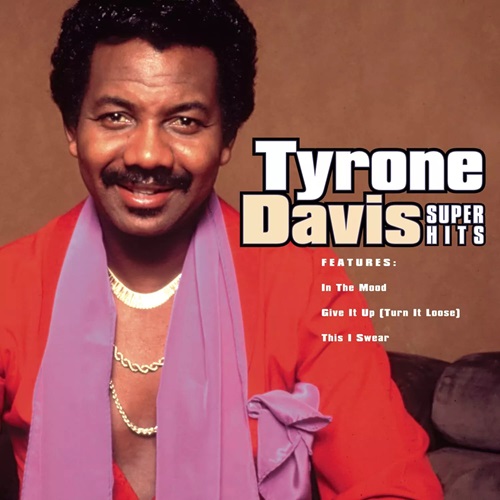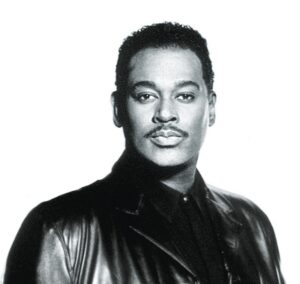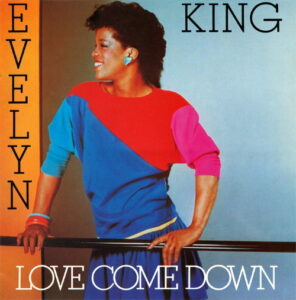He was unquestionably one of that group of tried-and-true soul men who worked year in and year out, performing before audiences who appreciated the honesty, authenticity and realness he brought to his music. Tyrone Davis – who passed away at the age of 67 in February 2005 – may not have been a household name with mainstream pop folks or the recipient of any major music industry awards (aside from a 1998 much-coveted Lifetime Achievement Award from the Rhythm & Blues Foundation) but among loyal, die-hard R&B lovers, he was a musical hero thanks to over forty R&B charted singles and over twenty best-selling albums produced over a recording career that spanned more than three decades.
The Davis musical story essentially began during Tyrone’s formative years, spent in Saginaw, Michigan. Tyrone moved to the city at the age of fourteen to be with his father, a minister, and it was after moving to Chicago in 1959 that he began working as a valet with blues man Freddie King. Tyrone’s penchant for the blues would be evident throughout his recording career: an amazing slowed-down blues version of Eddie Floyd’s “Knock On Wood” (included here and taken from his debut Dakar album) and the track “A Woman Needs To Be Loved” (from that first album) offer glimpses of the effective training Davis got during his early years in Chicago, befriending such blues giants as Bobby ‘Blue’ Bland and Little Milton, whom he considered mentors and fellow young performer Otis Clay, who would become a life-long friend.
Gaining valuable experience as a crowd-pleaser by singing at blues clubs on Chicago’s West Side, Tyrone was ‘discovered’ by singer/pianist Harold Burrage who essentially took the young performer under his wing. It was Burrage who helped secure Tyrone’s first recording with the local Four Brothers label; at the time he was performing as “Tyrone The Wonder Boy” and it was under this name that Davis’ first single, “Suffer” was released. After a few more singles, none of which garnered any national attention, Tyrone was ready for a change. Through then-manager Wally Roker, he signed with ABC Records: a first single, 1968’s “What If A Man” also failed to achieve any chart action.
In a June 1970 interview with Britain’s “Blues & Soul” magazine, Tyrone recounted at length the story behind the recording of what would become his first big hit. It seems he originally recorded “Can I Change My Mind” at Ray Charles’ Tangerine studios in Los Angeles (where ABC was based at the time) but the company didn’t like it. Although his manager said he could get Tyrone a new deal with RCA, he opted to take his then-new recording (along with another three songs he’d cut) back to Chicago to see if he could get further interest in it. A meeting with renowned Windy City producer and record executive Carl Davis seemed promising: Davis explained that at the time he was grooming some other acts (including The Chi-Lites) and asked the eager young singer to be patient.
Some months later, after Tyrone had tried unsuccessfully to place his masters with another company, he got a call from Davis who had zero-ed in on one of the songs on Tyrone’s tape. The song in question was “A Woman Needs To Be Loved” and Tyrone ended up re-doing it with Willie Henderson as producer. Carl Davis insisted on relegating “Can I Change My Mind” to the “B” side of the single when he issued it on his newly-formed Dakar label, initially distributed by Atlantic. Recalled Tyrone in his 1970 interview, “The record did nothing until I called a friend of mine in Houston, Texas and asked him to give it a flip.” Another call to a d.j. friend in Gary, Indiana and before he know it, Tyrone Davis found himself with his first national hit when Dakar re-released “Can I Change My Mind” (with its famous repetitive guitar line) in December of 1968, this time with national distribution with Brunswick.
Working consistently with musician and producer Henderson, the momentum Tyrone created with “Can I Change My Mind” was eclipsed in the spring of 1970 with the release of the equally memorable “Turn Back The Hands Of Time,” which became Tyrone’s enduring anthem. In between the two hit singles, Tyrone had cut his first album for Dakar but it was his sophomore album, released in the summer of 1970 that achieved even more success, becoming one of the soulful singer’s two Top 10 R&B best-selling albums for the label.
Tyrone was a fixture on the R&B charts with virtually every single Dakar released on him from 1968 to early 1976 when he left the label for Columbia Records. Most of his charted records were uptempo or midtempo cuts that featured the cream of Chicago’s top R&B musicians working at Brunswick’s studios with engineer Bruce Swedien (who would go on to be Quincy Jones’ chief engineer in the ‘80s) and were memorable for their crisp production, often sweetened with stellar string arrangements, courtesy Tom-Tom Washington. Tyrone worked consistently with the same team of writers and producers until 1971 when songwriter Leo Graham penned “Could I Forget You” for him; by 1973, Graham and Richard Parker became the chief production team for Dakar’s main attraction.
With a dynamic show featuring a band that author Robert Pruter described in his 1991 tome, “Chicago Soul” as “the most magnificent-sounding in any form of popular music, be it rock, blues, or soul…and only the James Brown aggregation had a band that could equal the live Davis band in rhythmic fury and overall flash and tighness of sound,” Tyrone quickly established himself as a seasoned performer who particularly endeared himself to female audiences and in 1979 he told author Pruter, “The ladies really like me, you know. I really don’t have a clue what it is about me they like, and it’s something I’ve often wondered about.”
The answer most likely lay in Tyrone Davis’ ability to use his blues roots to put that special soulful feeling into his music. Listen to his remarkable eight-minute-plus reading of fellow soul man Chuck Jackson’s 1961 hit, “I Wake Up Crying,” one of the many standouts on this special 2-CD collection or the sweet soul sound of “Was I Just A Fool,” a Top 30 R&B hit in 1972. Check out the funky flavor of “Where Lovers Meet” or the almost Southern soul ‘feel’ of “I’m Just Your Man.” While most of Tyrone Davis’ output was original material, he was also masterful at covering others’ songs, witness his cover of Tommy Edwards’ “It’s All In The Game,” the title cut for his fifth Dakar album, released in 1973; or his version of Stax soul star Johnnie Taylor’s “Love Bones.”
As competent as he was as a balladeer, Tyrone Davis’ legacy as a hitmaker will likely best be remembered with groove-laden tracks like “There It Is” and “Without You In My Life,” a pair of 1973 Top 10 R&B singles along with his enduring early Dakar classics.
Contributed by David Nathan










